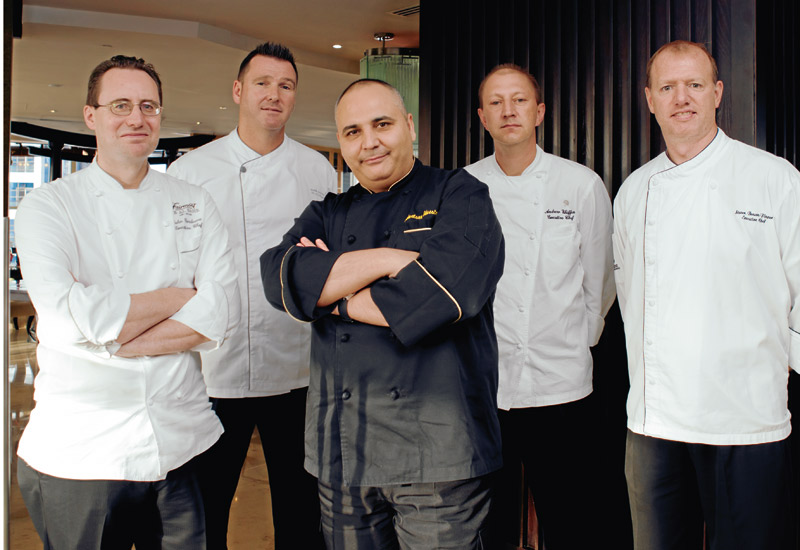If I asked where do you think the top food capital in the world is today what would you say?
ALL: (Singapore, London, Sydney, Hong Kong and New York)
MP: I would say Hong Kong, Singapore and London and you have to look back as it stems from consistent delivery of the product, innovation, but bang on when it comes to understanding concepts start to finish.

| Advertisement |
That’s where we have a great opportunity in Dubai, where we can have a foot in the door for trying to do something for the emirate while we are here to drive that forward.
Are there any conflicts in the relationships between exec chefs and GMs?
SBF: If you have respect for the company, respect for the team and you look after what you are supposed to, I don’t really see why you would have any issues with the management.
If you are a pleasant enough character and not an idiot, you are a manager and it’s the same with the general manager. I’ve never had any issues; we try and do the best we can with what we have.
SS: I suppose you expect the same relationship you have with your staff with your management — an open door policy so when there are issues they can be sorted out and things that need to be fixed get fixed.
SBF: Nobody likes to be micromanaged, especially chefs. We are different breeds and a lot of GMs and a lot of the new ones try to micromanage and it doesn’t work for us.
AW: Every GM I have ever had I’ve had heated discussions with. In a lot of ways it’s healthy.
JC: I think things have changed a great deal. People look to us far more for our input, we have far more of an impact in the hotel, honestly it’s fantastic.
MP: They want your 10 cents for everything, because when you are grown up about it all, it’s amazing how you become an asset.
SBF: Experience with knowledge is key. If you are a young 27- or 28-year-old exec chef you may not have that.
SS: But that’s why they get those 27- to 30-year-olds in, because they need someone to be a face for the that position, but they micromanage from behind. But when you have maturity and spend time in a property, they can see you can do the job so it becomes harder for some GMs to control.
MP: It’s also what you want to do; it’s in our blood if we’ve been doing it this amount of time. Would you ever be in F&B or change to GM?
JC: I did it and came back. I was an F&B director before I came to Abu Dhabi for three years. It was a great experience, but I missed the creativity and the passionate connection with people.
MP: Did you also find you were being micromanaged?
JC: Absolutely.
MP: That’s because you are [under the thumb] when you are an F&B manager. You are always a chef first, and when you are chef if you are doing a good job you’re left well alone. Nobody wants to have a clue of the kitchen. When it comes to suits, they don’t care, they want it to work and if it works you are a superstar, but in our industry you are a hero one day and zero the next.
JC: You are right, there is no other position in a hotel with that freedom. We can decide and we don’t have to go to a committee. It’s automatic, we change a product we move on, we try a concept and it’s exciting and you have ultimate control over your day and your destiny.
SBF: There are not many managers that can tell you what to do because we are specialists.
MP: Why do you want to become an F&B? You want to because you want to be a general manager; it’s a stepping stone to something else. But remember you have to be F&B, resident, or hotel manager, director of ops and then if you are lucky you might get to be GM.
You have to go through all those stages and then when you have an owner looking at your CV and you have been a chef for thirty years, how is their mind going to work?
JC: It was a great experience for me but my passion was the kitchen, I have a huge respect for all food and beverage directors.
I think I work far better with any F&B director because I have been there and I know exactly what they are going through. As an F&B director if you are not there [at an event], it doesn’t matter.
They are a critical role, but at the end of the day the chef is there, the banquet director is there, there’s a party going on for a 1000, the professionals are there doing the job, we’ve (the F&B director) set it all up, but do I need to be there?
We now impact hotels hugely, in every direction, marketing, PR finance, concepts, creativity, human resources. The chef today has a huge impact and it’s very exciting and that is how the job changed.









 Search our database of more than 2,700 industry companies
Search our database of more than 2,700 industry companies










Aug 4, 2011 , United Arab Emirates
Just one example of recognition of the chefs role came to light in the 1990's when a very large hotel company changed their Assistant Manager policy and decided to recruit their Hotel Managers from Heads of Department at operations level, (namely Head chefs, Housekeeping, Restaurant, Reception). ...